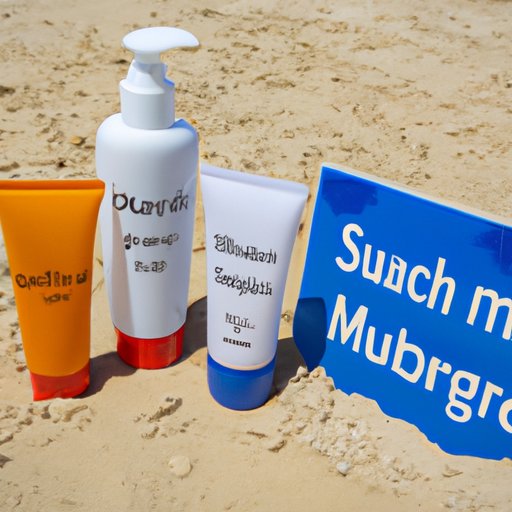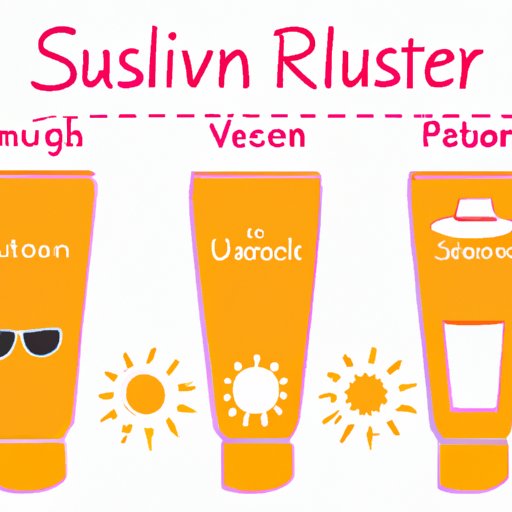Introduction
When it comes to protecting our skin from the sun, many of us are aware of the importance of wearing sunscreen. However, not all sunscreens are created equal; there are two main types of sunscreen available on the market: mineral and chemical. To understand why mineral sunscreen is better for skin health, it’s important to first understand the difference between these two types of sunscreen and the importance of UVA and UVB protection.
Explaining the Difference between Mineral and Chemical Sunscreen
The two main types of sunscreen are mineral and chemical. Mineral sunscreen, also known as physical sunscreen, contains natural minerals such as zinc oxide or titanium dioxide which sit on top of the skin, reflecting and scattering the sun’s rays away from the skin. Chemical sunscreen, on the other hand, contains synthetic chemicals such as oxybenzone, octinoxate, avobenzone and homosalate, which absorb the sun’s rays and then convert them into heat, which is then released from the skin.
UVA and UVB rays are both forms of ultraviolet radiation that come from the sun and can cause serious damage to the skin. UVA rays penetrate deeper into the skin, causing long-term damage such as wrinkles and sun spots, while UVB rays are more superficial and are primarily responsible for causing sunburn. Both UVA and UVB rays can increase the risk of skin cancer, so it’s important to ensure that any sunscreen you use offers protection from both types of rays.

Why Mineral Sunscreen is Better for Skin Health
Mineral sunscreen is made up of natural minerals such as zinc oxide and titanium dioxide, which offer broad spectrum protection against both UVA and UVB rays. These minerals work by sitting on top of the skin, reflecting and scattering the sun’s rays away from the skin, providing a physical barrier between the skin and the sun. This makes mineral sunscreen more effective at blocking out harmful UV rays than chemical sunscreen, which absorbs the rays and converts them into heat.
In addition to offering better protection against UVA and UVB rays, mineral sunscreen is also much gentler on the skin than chemical sunscreen. Many chemical sunscreens contain synthetic chemicals such as oxybenzone, octinoxate, and avobenzone, which can irritate the skin, clog pores, and even disrupt hormones. Mineral sunscreen, on the other hand, contains natural minerals that are much less likely to cause irritation or breakouts.

Research Studies Showing Mineral Sunscreen is Safer and More Effective
A number of research studies have been conducted to compare the effectiveness and safety of mineral and chemical sunscreen. One study, published in the Journal of the American Academy of Dermatology, found that mineral sunscreen was more effective at blocking UVA and UVB rays, while another study published in the journal Photodermatology, Photoimmunology & Photomedicine found that mineral sunscreen was less likely to cause skin irritation or allergic reactions.
Another study, published in the journal Clinical, Cosmetic and Investigational Dermatology, found that mineral sunscreen was more effective at protecting against UVA and UVB rays than chemical sunscreen. The study also found that mineral sunscreen was not only more effective but also more photostable, meaning it was less likely to degrade when exposed to sunlight.
Conclusion
It is clear from the research that mineral sunscreen is better for skin health than chemical sunscreen. Mineral sunscreen offers better protection against UVA and UVB rays, is less likely to cause skin irritation or breakouts, and is more photostable, meaning it is less likely to degrade in the sun. For these reasons, it is recommended that people choose a quality mineral sunscreen to protect their skin from the sun’s harmful rays.
(Note: Is this article not meeting your expectations? Do you have knowledge or insights to share? Unlock new opportunities and expand your reach by joining our authors team. Click Registration to join us and share your expertise with our readers.)
